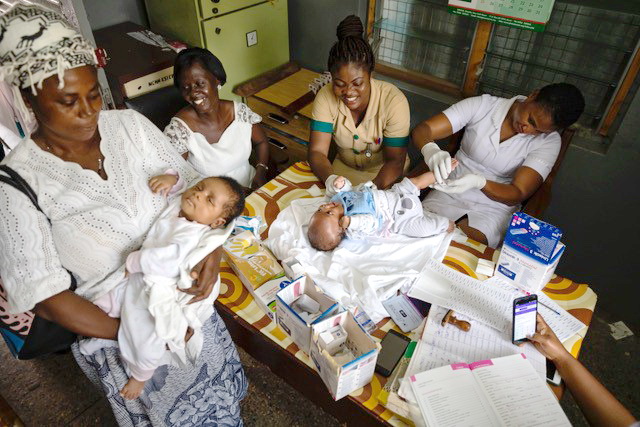
Novartis partners American Society of Hematology to fight sickle cell disease in Sub-Saharan Africa
Novartis has announced a partnership with the American Society of Hematology (ASH) to provide six additional African nations with technology already being used in Ghana to document and share the diagnosis of babies with sickle cell disease.
The other beneficiary countries, apart from Ghana, are Kenya, Liberia, Nigeria, Uganda, Tanzania and Zambia.
Early diagnosis is key to managing the disease and ensuring better health outcomes to improve the quality of life for people living with sickle cell disease (SCD).
A statement issued by Norvatis said the partnership with ASH will not only deliver better tools to track a baby’s diagnosis, it will also support greater knowledge on treatment and care, including through publications on research findings, professional education and dissemination to policy makers and other audiences.
Novartis partnership with ASH’s Consortium on Newborn Screening in Africa (CONSA) will provide standard-of-care practices for screening and early intervention therapies at participating institutions in the seven countries.
According to the statement, CONSA screens between 10,000 and 16,000 babies per year in each country and provides clinical follow-up for babies living with SCD and that the app will be used to collect and store data including screening results and medical histories for those people diagnosed with SCD.
It said the app has the benefit of tracking patients and migrating them to clinical enrollment for further care.
“ASH is excited to partner with Novartis to expand its current newborn screening consortium to new areas, with the implementation of digital tools to collect vital information. As we learn together about the implementation of early diagnosis and treatment, we will be able to show national and international partners the value of this work in saving lives,” the statement qoutes ASH President Jane N. Winter, MD, of the Robert H. Lurie Comprehensive Cancer Center at Northwestern University’s Feinberg School of Medicine, as saying.
Highlights
- Six African nations will join a partnership pioneered in Ghana using technology to track and better tackle sickle cell disease (SCD)
- Includes expanded rollout of an app to track babies diagnosed with SCD that is designed to work even with intermittent internet access, supporting early and effective care
- Partnership also broadens knowledge of disease burden and clinical pathway, enabling policy makers to include SCD as healthcare priority
- Hydroxyurea, current global standard of care for SCD, will be made available in more participating facilities.
“The app allows for offline data collection when internet connections are down, and then syncs the data once the connection is restored. Novartis and The Sickle Cell Foundation of Ghana worked with social impact technology organization, Dimagi, to add this feature which will now be rolled out to the six other CONSA nations as part of the new partnership.
“This partnership will bring greater awareness to sickle cell disease as well as hope to people living with SCD, especially in Africa where it's most prevalent. So many more people now see that it is worth fighting for,” said Dr. Yvonne Dei-Adomakoh, Head of Hematology at Korle-Bu Teaching Hospital, Director for the Ghana Institute of Clinical Genetics, and Senior Lecturer at University of Ghana Medical School.
“300,000 children are born with sickle cell disease each year, and around 75% of those are born in Sub Saharan Africa,” noted Dr. Bernard Awuonda, Consultant Pediatrician and CONSA project lead in Kenya. “Despite this, no country in our region has adopted a universal newborn screening program, making agreements like this all the more crucial in bringing hope to babies and their parents,” he said.
In addition to screening, access to timely treatment is also critical. Hydroxyurea (HU), the current global standard of care for SCD, will be made available in more facilities participating in CONSA.
“Sub-Saharan Africa has the highest SCD burden in the world and this partnership is a testament to our long-standing commitment to provide a comprehensive approach to disease management that encompasses early intervention strategies, such as screening and diagnosis; follow-up treatment such as HU; research to investigate new treatments; and education and advocacy to improve access to existing therapies,” said Racey Muchilwa, Country President and the Head of Novartis sub-Saharan Africa. “The Novartis Africa Sickle Cell Disease program is implemented through public-private partnerships with local governments, as well as collaborations with universities, patient groups, professional societies and other organizations,” she added.
About Sickle Cell Disease
SCD is an inherited blood disorder which is life threatening and causes suffering throughout the lives of many of those affected, including acute painful episodes, anemia, organ damage, chronic pain, and fatigue. Over 300,000 children are born with SCD in Africa every year; more than half do not survive past their fifth birthday2. A recent study demonstrated that large-scale, universal screening could save the lives of up to 10 million children globally.
